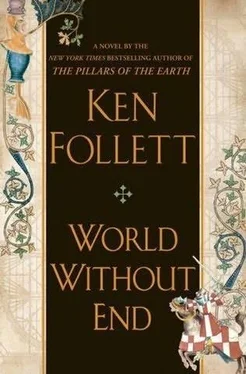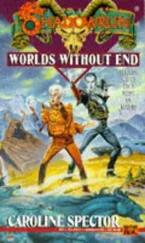“Brother Thomas likes it,” Merthin replied.
“What about Prior Anthony?”
“He hasn’t seen it. But he’ll accept it. He won’t want to pay twice.”
That was true, Caris thought. Her uncle Anthony was unadventurous, but parsimonious too. The mention of the prior reminded her of her errand. “My father wants you to meet him and the prior at the bridge.”
“Did he say why?”
“I think he’s going to ask Anthony to build a new bridge.”
Merthin put his tools into a leather satchel, and quickly swept the floor, brushing sawdust and wood shavings out of the porch. Then he and Caris walked in the rain through the fair and down the main street to the wooden bridge. Caris told him what Buonaventura had said at the breakfast table. Merthin felt, as she did, that recent fairs had not been as bustling as those he remembered from childhood.
Despite that, there was a long queue of people and carts waiting to get into Kingsbridge. At the near end of the bridge was a small gatehouse where a monk sat taking a fee of one penny from every trader who entered the city with goods for sale. The bridge was narrow, so it was not possible for anyone to jump the queue, and in consequence people who did not need to pay – residents of the town, mainly – also had to stand in line. In addition, some of the boards that formed the surface were twisted and broken, so carts had to move slowly as they crossed. The result was that the queue stretched away along the road between the suburban hovels and disappeared into the rain.
The bridge was also too short. Once, no doubt, both its ends had given on to dry land. But either the river had widened or, more likely, the passage of carts and people over decades and centuries had flattened the banks, so that now people had to wade across muddy beaches on both sides.
Caris saw that Merthin was studying its structure. She knew that look in his eyes: he was thinking about how it stayed upright. She often caught him staring at something in that way, usually in the cathedral, but sometimes in front of a house or even something natural, a thorn tree in blossom or a sparrowhawk hovering. He became very still, his gaze bright and sharp, as if he were shining a light into a murky place, trying to make out what was there. If she asked him, he told her he was trying to see the insides of things.
She followed his gaze and strained to imagine what he perceived in the old bridge. It was sixty yards from end to end, the longest bridge she had ever seen. The roadbed was supported by massive oak piers in two rows, like the pillars that marched either side of the nave of the cathedral. There were five pairs of piers. The end ones, where the water was shallow, were quite short, but the three central pairs stood fifteen feet above the water line.
Each pier consisted of four oak beams in a cluster, held together by plank braces. Legend said that the king had given Kingsbridge Priory the twenty-four best oak trees in England to build the three central pairs of piers. The tops were linked by beams in two parallel lines. Shorter beams crossed from one line to the other, forming the roadbed; and longitudinal planks had been laid on top to form the road surface. On each side was a wooden railing that served as a flimsy parapet. Every couple of years a drunk peasant would drive a cart through the rail and kill himself and his horse in the river.
“What are you looking at?” Caris asked Merthin.
“The cracks.”
“I don’t see any.”
“The timbers on either side of the central pier are splitting. You can see where Elfric has reinforced them with iron braces.”
Now that he pointed them out, Caris could see the flat metal strips nailed across the cracks. “You look worried,” she said to him.
“I don’t know why the timbers cracked in the first place.”
“Does it matter?”
“Of course it does.”
He was not very talkative this morning. She was about to ask him why, when he said: “Here comes your father.”
She looked along the street. The two brothers made an odd pair. Tall Anthony fastidiously held up the skirts of his monkish robe and stepped gingerly around the puddles, wearing an expression of distaste on his pale indoor face. Edmund, more vigorous despite being the elder, had a red face and a long untidy grey beard, and he walked carelessly, dragging his withered leg through the mud, speaking argumentatively and gesturing extravagantly with both arms. When Caris saw her father at a distance, the way a stranger might see him, she always felt a surge of love.
The dispute was in full swing when they got to the bridge, and they continued without pause. “Look at that queue!” Edmund shouted. “Hundreds of people not trading at the fair because they haven’t got there yet! And you can be sure half of them will meet a buyer or seller while waiting, and conduct their business right then and there, then go home without even entering the city!”
“That’s forestalling, and it’s against the law,” said Anthony.
“You could go and tell them that, if you could get across the bridge, but you can’t, because it’s too narrow! Listen, Anthony. If the Italians pull out, the Fleece Fair will never be the same again. Your prosperity and mine are based on the fair – we must not just let it go!”
“We can’t force Buonaventura to do business here.”
“But we can make our fair more attractive than Shiring’s. We need to announce a big, symbolic project, right now, this week, something to convince them all that the Fleece Fair isn’t finished. We have to tell them we’re going to tear down this old bridge and build a new one, twice as wide.” Without warning, he turned to Merthin. “How long would it take, young lad?”
Merthin looked startled, but he answered. “Finding the trees would be the hard part. You need very long timbers, well seasoned. Then the piers have to be driven into the river bed – that’s tricky, because you’re working in running water. After that it’s just carpentry. You could finish it by Christmas.”
Anthony said: “There’s no certainty the Caroli family will change its plans if we build a new bridge.”
“They will,” Edmund said forcefully. “I guarantee it.”
“Anyway, I can’t afford to build a bridge. I don’t have the money.”
“You can’t afford not to build a bridge,” Edmund shouted. “You’ll ruin yourself as well as the town.”
“It’s out of the question. I don’t even know where I’m going to get the money for the repairs in the south aisle.”
“So what will you do?”
“Trust in God.”
“Those who trust in God and sow a seed may reap a harvest. But you’re not sowing the seed.”
Anthony got irritated. “I know this is difficult for you to understand, Edmund, but Kingsbridge Priory is not a commercial enterprise. We’re here to worship God, not to make money.”
“You won’t worship God for long if you’ve nothing to eat.”
“God will provide.”
Edmund’s red face flushed with anger, turning a purplish colour. “When you were a boy, our father’s business fed you and clothed you and paid for your education. Since you’ve been a monk, the citizens of this town and the peasants of the surrounding countryside have kept you alive by paying you rents, tithes, charges for market stalls, bridge tolls, and a dozen other different fees. All your life you’ve lived like a flea on the backs of hard-working people. And now you have the nerve to tell us that God provides.”
“That’s perilously close to blasphemy.”
“Don’t forget that I’ve known you since you were born, Anthony. You always had a talent for avoiding work.” Edmund’s voice, so often raised in a shout, now dropped – a sign, Caris knew, that he was really furious. “When it was time to empty out the privy, you went off to bed, so that you would be rested for school the next day. Father’s gift to God, you always had the best of everything, and never lifted your hand to earn it. Strengthening food, the warmest bedroom, the best clothes – I was the only boy who wore his younger brother’s cast-off outfits!”
Читать дальше












